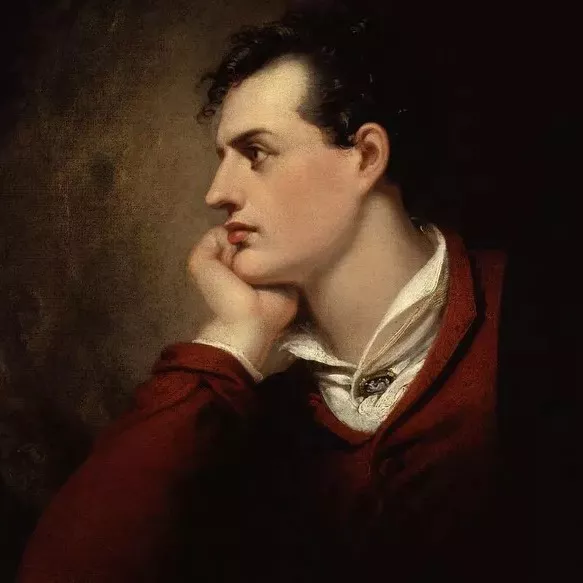
Lord Byron (1788–1824), born George Gordon Byron, was a leading figure of the Romantic movement. Renowned for his passionate, rebellious personality and his iconic works, Byron’s poetry explored themes of love, nature, and existential struggle. His influence extended beyond literature into the realm of culture and politics, cementing his legacy as one of the most charismatic poets in English history.
Lord Byron Biography
George Gordon Byron was born on January 22, 1788, in London, England, into an aristocratic but financially troubled family. His father, nicknamed “Mad Jack,” was a reckless spender, while his mother, Catherine Gordon, struggled to provide Byron with stability. He inherited the title of Lord Byron at the age of ten after the death of his great-uncle, which brought him to Newstead Abbey, the Byron family estate.
Byron attended Harrow School and later Trinity College, Cambridge, where his charm and flamboyant personality became evident. At Cambridge, he published his first collection of poems, Hours of Idleness (1807). Though this work received mixed reviews, Byron retaliated with English Bards and Scotch Reviewers (1809), a satirical work that established his wit and literary prowess.
In 1809, Byron embarked on a grand tour of Europe and the Middle East, an experience that deeply influenced his poetry. During this time, he wrote Childe Harold’s Pilgrimage, a semi-autobiographical poem that catapulted him to fame upon its publication in 1812. The work introduced the Byronic hero—a passionate, brooding, and flawed character that became synonymous with his name.
Byron’s personal life was as dramatic as his poetry. His relationships with numerous women, including Lady Caroline Lamb and his half-sister Augusta Leigh, created scandal. In 1815, he married Annabella Milbanke, but the marriage quickly ended in separation, leaving Byron further vilified by society.
Fleeing England in 1816, Byron lived in Switzerland and later Italy, where he produced some of his most celebrated works, including Don Juan and Manfred. In Italy, he joined revolutionary movements for Italian independence, demonstrating his commitment to political causes.
In 1823, Byron traveled to Greece to support its war of independence against the Ottoman Empire. His health deteriorated in the harsh conditions, and he succumbed to a fever on April 19, 1824, at the age of 36. Despite his short life, Byron’s poetry and persona left an indelible mark on Romanticism and the literary world.
Lord Byron Poems
Byron’s poetry is known for its emotional intensity, lyrical beauty, and exploration of existential themes. Below are some of his most significant works:
1.“Childe Harold’s Pilgrimage”
This long narrative poem chronicles the travels and reflections of a world-weary protagonist. It established Byron’s fame and introduced the archetypal Byronic hero, reflecting themes of exile and existential longing.
2.“Don Juan”
A satirical epic, Don Juan reimagines the legendary lover as a naive and innocent man. The poem blends humor, social critique, and personal reflections, showcasing Byron’s wit and storytelling mastery.
3.“She Walks in Beauty”
One of Byron’s most famous lyric poems, it celebrates a woman’s serene beauty, combining physical and moral grace with exquisite simplicity.
4.“The Giaour”
A dramatic narrative poem, The Giaour explores themes of love, revenge, and guilt set against an exotic Eastern backdrop. It reflects Byron’s fascination with Orientalism.
5.“Manfred”
This dramatic poem centers on a tormented protagonist seeking redemption and self-understanding. It is a powerful exploration of guilt, defiance, and the limits of human experience.
6.“When We Two Parted”
A poignant lyric on lost love, this poem captures the pain of separation and lingering emotional scars with heartfelt clarity.
7.“The Corsair”
A romantic tale of a pirate’s tragic love and betrayal, this poem was immensely popular in Byron’s time, further cementing his fame.
8.“Darkness”
A haunting and apocalyptic vision of a sunless world, this poem reflects Byron’s pessimism and his fascination with existential despair.
9.“So We’ll Go No More a Roving”
This short yet evocative lyric expresses the inevitability of aging and the passage of time with a melancholic tone.
10.“Prometheus”
A tribute to the mythic Titan, this poem celebrates defiance against tyranny and suffering as a form of heroic endurance.
Byron’s works continue to resonate for their emotional depth, lyrical elegance, and philosophical explorations.
Lord Byron Quotes
1.“I love not man the less, but Nature more.”
2.“There is pleasure in the pathless woods.”
3.“If I don’t write to empty my mind, I go mad.”
4.“The great art of life is sensation, to feel that we exist, even in pain.”
5.“Friendship is love without wings.”
6.“The best prophet of the future is the past.”
7.“Fools are my theme, let satire be my song.”
8.“And, after all, what is a lie? ‘Tis but the truth in masquerade.”
9.“To have joy, one must share it.”
10.“For the sword outwears its sheath, and the soul wears out the breast.”
Lord Byron Facts
1.Byron was born with a clubfoot, a physical condition that caused him lifelong pain but did not hinder his adventurous spirit.
2.His pet menagerie included a bear while he was a student at Cambridge.
3.Byron was a fervent supporter of Greek independence and is considered a national hero in Greece.
4.He coined the term “Byronic hero,” embodying traits of brooding, passion, and rebellion.
5.Byron’s romantic escapades included relationships with both men and women, breaking societal norms of his time.
6.Childe Harold’s Pilgrimage made Byron an overnight celebrity, inspiring the phrase, “He awoke one morning and found himself famous.”
7.Byron’s friendship with Percy Bysshe Shelley and Mary Shelley was pivotal to his literary and personal life.
8.He wrote She Walks in Beauty after being struck by a woman’s beauty at a social gathering.
9.Byron’s scandalous personal life led to his self-imposed exile from England in 1816.
10.Byron died at 36, but his contributions to literature and his charismatic persona left an enduring legacy.
